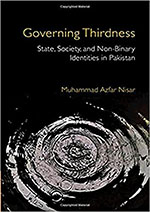The book under review by Muhammad Azfar Nisar provides important insights into the identity, marginalization and governance of the Khawaja Sira of Pakistan. Based on ethnographic fieldwork in Lahore, it studies various forms of governance of the Khawaja Sira community across legal, social and administrative institutions.
Muhammad Azfar Nisar is an Assistant Professor of Public Policy & Administration at the Suleman Dawood School of Business, Lahore University of Management Sciences. His research focuses on issues related to policy implementation, public administration, health policy, gender identity, and governance.
The author defines the Khawaja Sira community of Pakistan as a group of heterogeneous individuals with contested identities. While most of them in the community are male with a reference to the feminine gender, those born with inter-sex characters, impotent individuals and victims of childhood sexual abuse also belong to this community. With regard to placing the community in a larger gender prism, the author decides not to situate the work within ‘transgender’ and ‘queer’ theories, arguing that these have been developed for and by the West. The empirical focus of the work covers three key aspects of governance—categorization, discipline, and disposal, all of which are common across all institutions. The author looks at these multiple forms of governance that intersect with the lives of the Khawaja Sira and how this intersectionality influences social equity by creating, sustaining or contesting the condition of those living at the margins of state and society.

